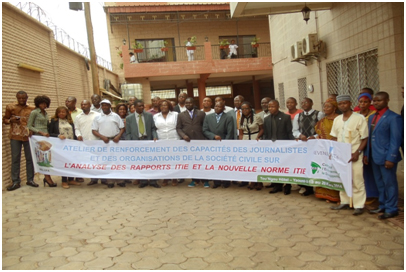
Compliance in Cameroon: Civil Society Leads Ambitious EITI Work Plan
Cameroon is one of fourteen African countries that have joined the Extractive Industries Transparency Initiative (EITI), a global coalition of partners committed to improving open and accountable management of natural resource revenues. And since the approval of major changes to the EITI reporting standard last year, the West African country is making strides to advance its implementation efforts.
"Cameroon now has one of the most ambitious—and most in-line with the new standard—EITI workplans," said Evelyne Tsague, francophone Africa regional coordinator at the Natural Resource Governance Institute (NRGI). "I am really encouraged by the renewed collaboration by the different stakeholders in the multi-stakeholder group."
The Cameroonian government first declared its intent to join EITI in 2005 but wasn’t declared "compliant" until 2013. Like other EITI countries, Cameroon has a multi-stakeholder group (MSG) that implements a work plan after the EITI Standard, a global reporting mandate detailing a host of extractive sector issues, including a country’s fiscal regime, production, transportation payments, revenue management and expenditure, subnational transfers, social expenditures by extractive companies, as well as beneficial ownership and contract disclosure issues. And like other countries it has struggled to revise its work plan after changes to the standard were adopted at a global forum last year in Sydney. The MSG, one member observed, lacked sufficient understanding of the changes and their impact on compliance efforts in Cameroon.
To fill the knowledge gap, two civil society organizations (CSOs), Centre pour l’environnement et le developpement (CED) and Reseau de lutte contre la fain (RELUFA) organized a three-day workshop in Yaoundé, Cameroon, earlier this year, with technical assistance and financial support from NRGI (formerly the Revenue Watch Institute – Natural Resource Charter). About 30 CSO actors and journalists participated, including those from oil and mining communities in distant regions of the country. The workshop aimed to increase participants’ understanding of the new rules, produce an appropriate strategy for EITI implementation, and strengthen the work plan.
And there is much at stake for the resource-rich country. As much as 25 percent of Cameroon’s budget is funded by oil and gas production, and capacity is expected to grow by 9 percent, thanks to foreign investments that have increased the number of oil wells in the country. The mining sector is also experiencing an exploration boom.
Before attending the workshop, Victor Amougou of CEFAID had never seen an EITI report. Now, he says he feels "privileged" to work with the documents. "My colleagues and I will review them and discuss what we can do to support the initiative and make sure that the concerns of our communities are fully addressed," he adds.

In Cameroon, there is currently little transparency in the license allocation process. This and other challenges were the focus of an EITI workshop earlier this year.
After a thorough review of EITI, Amougou and other workshop participants discussed their concerns and identified governance issues that the new standard could help address. For example, in Cameroon there is currently little transparency in the license allocation process and no public register of licenses. Mining and foresting licenses overlap, with no distinction between them. Furthermore, there is no legal framework regulating subnational revenue transfers, no information on the management of direct transfers made by the national oil company, and no regular reporting on the national oil company and other state entities involved in the extractive sector. Participants also reported instances of conflict of interest, unpublished contracts, and unreliable data.
In light of the new standard, participants identified several priorities to guide their work plan, including clear and transparent policies for licenses, as well as full disclosure of contracts, beneficial ownership, and production volumes. They also sought an effective mechanism for revenue sharing, a reformed legal framework for the extractive sector, and clear follow-up on projects and their socio-environmental impact. As a result, participants say they expect improvements in the country’s laws, mining codes, and public debate around EITI and the extractive sector. Ongoing reforms in Cameroon’s mining codes, as well as a World Bank-funded capacity building initiative, Projet de Renforcement des Capacités dans le Secteur Minier, are helping.
For their part, journalists who participated in the workshop committed to actively report on resource governance issues in Cameroon. Armand Ougock, a journalist from the online news site Camer.be, published several articles (see examples here and here) reporting that the workshop served to "strengthen [his] ability to make relevant analysis and quality reporting on extractive issues."
Following the workshop, CSOs shared recommendations to the MSG, the national EITI Secretariat and the minister. During a meeting of the MSG, the majority of suggestions were considered, and the CSO representatives were tasked with revising the work plan and monitoring progress.
"I really encourage you to maintain this momentum," NRGI’s Evelyne Tsague said in closing. Cameroon will submit its next EITI report on December 31, 2014.
Emma Tarrant Tayou served as NRGI’s Africa regional associate for the past three years.
To read more about the workshop in French, please visit the Publish What You Pay blog.
